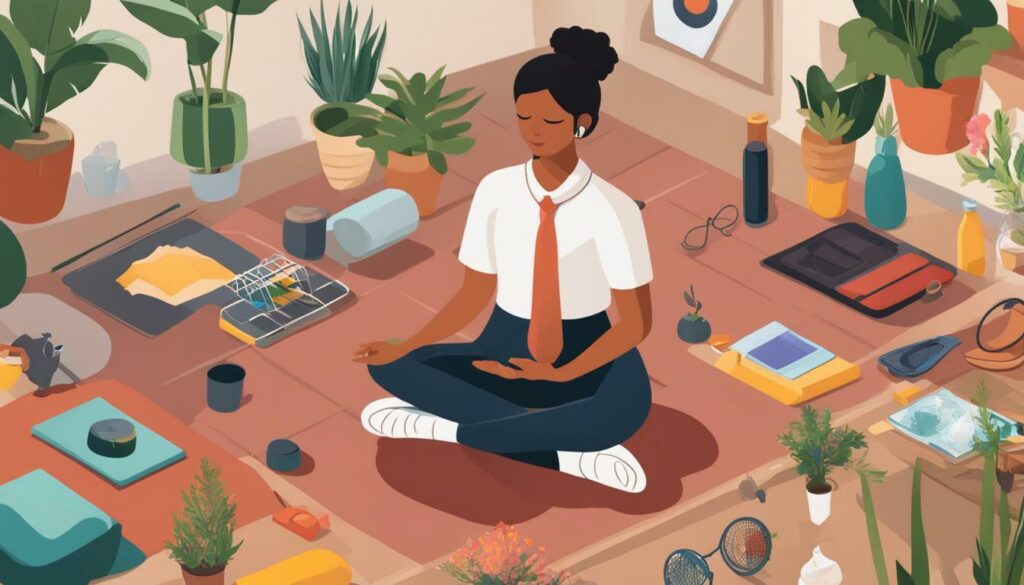Stress can have a significant impact on our physical and mental health, but with the right tools and strategies, it is possible to find relief and lead a more balanced life. In this section, we will explore various stress relief methods that can improve your overall wellbeing. Discover effective techniques to manage and reduce stress for a healthier, happier life.
- Engaging in physical activity boosts endorphins and improves mood.
- A healthy diet plays a vital role in managing stress effectively.
- Practicing mindfulness and relaxation techniques can bring about a sense of calm and reduce stress levels.
- Building a support network is essential for stress management.
- Establishing healthy boundaries and learning to say no are essential skills for managing stress effectively.
By incorporating these stress relief methods into your lifestyle, you can create a balanced and healthier life. Stay tuned for the rest of the article as we delve into each of these topics in more detail.
Physical Activity: Pump Up Your Endorphins
Regular physical activity can be a powerful stress reliever, as it helps release tension and promotes a sense of well-being. Engaging in activities that get your body moving not only improves your physical health but also has a positive impact on your mental and emotional well-being. Whether it’s going for a brisk walk, hitting the gym, or enjoying your favorite sport, incorporating exercise into your routine can significantly reduce stress levels.
Exercise is known to boost endorphins, those feel-good hormones that can improve your mood and provide a natural sense of euphoria. When you engage in physical activity, your brain releases these chemicals, helping you feel more relaxed and better equipped to deal with stressors. Additionally, regular movement can help distract your mind from daily worries and promote a sense of focus and clarity.
To make the most of your stress relief activities, it’s important to find exercises that you enjoy and can easily incorporate into your routine. This could be anything from dancing, cycling, swimming, yoga, or even gardening. The key is to choose activities that you find enjoyable and that align with your interests and preferences.

Physical activity not only helps relieve stress but also improves your overall health and well-being. Incorporating regular exercise into your routine can be a game-changer when it comes to managing stress effectively. So why not take a step towards a healthier and happier life by finding stress relief activities that get your heart pumping and your endorphins flowing?
Nourish Your Body with a Healthy Diet.
Proper nutrition plays a crucial role in managing stress, and making mindful choices about what we eat can greatly improve our overall well-being. A healthy diet not only provides essential nutrients for our bodies but also contributes to a balanced mood and energy levels, which are key factors in stress management. By fueling our bodies with nutritious foods, we can better cope with stress and enhance our resilience.
When it comes to natural stress relief, incorporating certain foods into our meals can have a positive impact on our mental and emotional well-being. Here are some stress-relief tips to nourish your body:
- Include plenty of fruits and vegetables in your diet. These nutrient-rich foods are packed with antioxidants, vitamins, and minerals that support brain health and reduce oxidative stress.
- Opt for whole grains like quinoa, brown rice, and whole wheat bread instead of refined grains. Whole grains provide a steady release of energy and help stabilize blood sugar levels, which can promote a more stable mood.
- Consume foods rich in omega-3 fatty acids such as fatty fish (salmon, mackerel), walnuts, and flaxseeds. Omega-3s have been shown to reduce inflammation and support brain health, potentially alleviating symptoms of stress and anxiety.
To further enhance the stress-relieving effects of your diet, it’s important to avoid or minimize certain foods and drinks that can exacerbate stress. These include:
- Limit caffeine intake as it can increase anxiety and disrupt sleep patterns. Instead, opt for herbal teas or decaffeinated beverages.
- Avoid excessive alcohol consumption as it can negatively affect mood, sleep quality, and overall well-being.
- Minimize the consumption of processed and sugary foods, as they can lead to energy crashes and mood fluctuations.
By incorporating these stress relief tips into your diet, you can nourish your body and mind, creating a solid foundation for managing stress effectively.

| Food Category | Stress-Relieving Foods |
|---|---|
| Fruits and Vegetables | Blueberries, oranges, spinach, kale |
| Whole Grains | Quinoa, brown rice, whole wheat bread |
| Omega-3 Fatty Acids | Fatty fish (salmon, mackerel), walnuts, flaxseeds |
Mindfulness and Relaxation Techniques
Incorporating mindfulness and relaxation techniques into your daily routine can help you achieve a sense of inner calm and better manage stress. These practices have been proven to reduce anxiety, improve focus, and promote overall well-being.
One effective technique is meditation, which involves focusing your attention on the present moment and letting go of any intrusive thoughts or worries. Taking just a few minutes each day to sit quietly, close your eyes, and focus on your breath can have a profound impact on your stress levels.
Deep breathing exercises are another powerful tool for relaxation. By taking slow, deep breaths and fully exhaling, you can activate the body’s relaxation response and calm the nervous system. This technique can be done anywhere and at any time, making it a convenient option for stress relief.
Yoga combines physical movement, breathing exercises, and mindfulness to create a holistic approach to stress reduction. The gentle stretching and flowing movements help release tension in the body, while the focused breathing and mindfulness practices calm the mind. Practicing yoga regularly can improve flexibility, strength, and overall well-being.

- Find a comfortable position, either sitting or lying down.
- Close your eyes and take a deep breath in through your nose, expanding your belly as you inhale.
- Hold your breath for a moment, then exhale slowly through your mouth, emptying your lungs completely.
- Repeat this process, focusing on the sensation of your breath entering and leaving your body.
- Continue for several minutes, allowing yourself to relax and let go of any tension or stress.
“The present moment is the only time over which we have dominion.” – Thich Nhat Hanh
Incorporating mindfulness and relaxation techniques into your daily routine can provide a much-needed respite from the demands of everyday life. By taking time for yourself and engaging in these practices, you can nourish your mind, body, and spirit, leading to a healthier, happier you.
| Technique | Benefits |
|---|---|
| Meditation | Reduces anxiety, improves focus, promotes relaxation |
| Deep Breathing | Activates relaxation response, calms the nervous system |
| Yoga | Relieves tension, improves flexibility and strength |
The Power of Social Support
Surrounding yourself with supportive friends and family can make a significant difference in how you cope with stress. Building a strong support network is one of the most effective stress reduction strategies. When we have people we can lean on, share our concerns with, and seek guidance from, it can lighten the burden of stress and provide us with a sense of comfort and reassurance.
Having a support system not only helps us feel understood and heard, but it also provides us with different perspectives and solutions to our problems. Close relationships can offer a safe space for venting and emotional release, allowing us to express our feelings without fear of judgment. The act of verbalizing our stressors can often bring clarity and help us gain a new perspective on challenging situations.
Moreover, sharing enjoyable activities and spending quality time with friends and family can be a great stress reliever. Whether it’s going for a walk together, engaging in a hobby, or simply having a heartfelt conversation, these interactions can help distract our minds from stress and foster a sense of connection and belonging.
Supportive Relationships: A Key to Stress Management
Research has shown that individuals with strong support systems tend to have better mental health and overall well-being. According to a study published in the Journal of Health and Social Behavior, social support can act as a buffer against stress, lowering the risk of developing stress-related health problems.
| Benefits of Social Support for Stress Management |
|---|
| Decreased levels of stress hormones |
| Enhanced coping strategies |
| Improved immune function |
| Reduced feelings of loneliness and isolation |
| Increased life satisfaction |
It’s important to nurture and cultivate supportive relationships in our lives. Here are some tips to help you build and sustain a strong support network:
- Seek out like-minded individuals or join groups with similar interests or hobbies.
- Make an effort to maintain regular communication with loved ones, even if it’s just a quick check-in or virtual chat.
- Be available and attentive to the needs of your friends and family, providing a listening ear and offering support when they need it.
- Don’t hesitate to reach out for help when you’re feeling overwhelmed or stressed. It’s okay to lean on others and ask for support.
Incorporating social support into your stress management toolkit can have a profound impact on your well-being. By building a network of caring and supportive individuals, you can navigate through life’s challenges with greater resilience and experience a healthier, happier life.

Learning to set boundaries and say no when necessary is crucial in maintaining a balanced and stress-free life. When we fail to establish boundaries, we can easily become overwhelmed and depleted, leading to increased stress levels. By setting clear limits and communicating our needs, we can create a healthier and more harmonious environment for ourselves and those around us.
One effective way to set boundaries is by identifying your priorities and values. Take some time to reflect on what is truly important to you and what you are willing to dedicate your time and energy to. This will help you establish boundaries that align with your goals and prevent you from taking on unnecessary stress or commitments.
Another important aspect of boundary setting is learning to say no. Saying no is not a sign of weakness or selfishness, but a way of prioritizing your well-being and preserving your energy. Remember that you have the right to decline requests or invitations that do not resonate with your values or contribute to your overall happiness.
| Benefits of Setting Boundaries and Saying No: |
|---|
| 1. Reduces stress: Setting boundaries helps prevent overload and burnout, reducing stress levels. |
| 2. Preserves energy: Saying no to unnecessary commitments allows you to focus on what truly matters and conserve your energy. |
| 3. Improves relationships: Setting clear boundaries fosters healthier relationships by ensuring mutual respect and understanding. |
Implementing Boundaries in Daily Life
Here are some practical tips to help you implement boundaries and confidently say no:
- Know your limits and communicate them clearly to others.
- Practice assertiveness by expressing your needs and opinions respectfully.
- Take time for self-reflection and self-care to recharge and maintain balance.
- Surround yourself with supportive individuals who respect your boundaries.
“Remember that setting boundaries and saying no is an act of self-care, prioritizing your well-being and ensuring a healthier, happier life.”
By incorporating these strategies into your daily life, you can effectively manage stress, protect your well-being, and create a more balanced and fulfilling lifestyle. Remember that setting boundaries and saying no is an act of self-care, prioritizing your well-being and ensuring a healthier, happier life.

Journaling and expressive writing can serve as powerful tools to relieve stress and gain a deeper understanding of your thoughts and emotions. Taking the time to put pen to paper allows you to express yourself freely and process any pent-up emotions or worries. It’s a cathartic process that can help you release negative energy and find clarity amidst life’s challenges.
One of the benefits of journaling is that it allows you to reflect on your experiences and explore the root causes of your stress. By writing down your thoughts, you can gain new insights and perspective, helping you gain a sense of control over your emotions. It’s a form of self-care that promotes self-reflection and personal growth.
There are various approaches to journaling that you can try. Some people prefer to keep a gratitude journal, where they write down things they’re thankful for each day. This practice helps shift your focus from stress to appreciation. Others may prefer to write about their worries and fears, allowing themselves to confront and acknowledge their emotions. Whatever approach you choose, the key is to be honest and authentic in your writing.

- Describe a recent situation that caused you stress. How did it make you feel, and how did you handle it?
- What are three things you’re grateful for today, and why?
- Write about a challenge you’re currently facing. How can you reframe it as an opportunity for growth?
- Reflect on a time when you overcame a stressful situation. What lessons did you learn from that experience?
Remember, there is no right or wrong way to journal. The process is individual and unique to each person. Find what works for you and make it a regular practice. By incorporating journaling into your routine, you can cultivate a sense of calm, reduce stress, and foster personal development.
| Benefits of Journaling and Expressive Writing | How to Get Started |
|---|---|
| 1. Stress relief and emotional release | 1. Set aside dedicated time each day or week for journaling |
| 2. Increased self-awareness and self-reflection | 2. Find a quiet and comfortable space to write |
| 3. Clarity and problem-solving | 3. Use prompts or write freely, whatever feels right for you |
| 4. Personal growth and self-discovery | 4. Be honest and authentic in your writing |
Aromatherapy for Relaxation
Harness the power of scents to create a soothing environment and alleviate stress with the practice of aromatherapy. This natural stress relief method utilizes essential oils derived from plants to promote relaxation and create a sense of calm. By incorporating aromatherapy into your daily routine, you can enhance your overall well-being and effectively manage stress.
Essential oils have been used for centuries to promote physical and emotional well-being. These concentrated plant extracts have unique properties that can positively impact our mood and relaxation. Lavender, for example, is known for its calming effects, while citrus oils like lemon and orange can uplift and energize.
To experience the benefits of aromatherapy, you can use essential oils in various ways. Diffusing oils in a diffuser or adding a few drops to a hot bath can create a relaxing atmosphere. You can also blend oils with carrier oils, such as jojoba or coconut oil, and apply them topically for a soothing massage or as a natural perfume. However, it’s important to note that some oils may cause skin irritation, so it’s advisable to conduct a patch test before applying them directly to your skin.
| Essential Oil | Benefits |
|---|---|
| Lavender | Promotes relaxation and sleep |
| Peppermint | Boosts energy and mental clarity |
| Chamomile | Calms the mind and reduces anxiety |
| Ylang Ylang | Eases stress and promotes a sense of well-being |
Aromatherapy is a versatile and accessible stress relief technique that can be easily incorporated into your daily life. Experiment with different essential oils to find the scents that resonate with you. Whether you choose to diffuse oils, create personalized blends, or add them to your self-care routine, aromatherapy can provide a natural and effective way to relax and unwind.

Embracing gratitude as a regular practice can bring about positive emotions, reduce stress, and improve overall well-being. When we focus on the things we are grateful for, it shifts our perspective and helps us find joy in the present moment. Cultivating gratitude can be done through simple exercises that can easily be incorporated into your daily routine.
One effective method is to keep a gratitude journal. Taking a few minutes each day to write down things you are grateful for can help you acknowledge and appreciate the good in your life. Whether it’s a kind gesture from a friend, a beautiful sunset, or a personal achievement, jotting down these moments can help shift your focus away from stress and promote a more positive mindset.
Another way to practice gratitude is by expressing it to others. Sending a heartfelt thank you note, expressing gratitude in person, or even just acknowledging someone’s efforts can not only make them feel appreciated but also bring a sense of joy and fulfillment to yourself.

| Benefits of Gratitude Practice | Ways to Incorporate Gratitude |
|---|---|
|
|
By incorporating gratitude into your daily life, you can experience the many benefits it brings. Whether it’s through journaling, expressing gratitude to others, or finding your own unique way to practice, taking the time to be grateful can transform your mindset and help you navigate stressful situations with ease.
Creating a Balanced Lifestyle
Achieving a balanced lifestyle is key to managing stress effectively and maintaining overall health and well-being. When we prioritize self-care and reduce stressors in our lives, we create a foundation for a happier and more fulfilling existence. Here are some stress management techniques and tips to help you achieve a balanced lifestyle:
- Self-Care Activities: Make time for activities that bring you joy and relaxation. This could be anything from reading a book to taking a long bath or practicing a hobby you love. Engaging in activities that you enjoy can help reduce stress and rejuvenate your mind and body.
- Sleep: Getting enough quality sleep is crucial for managing stress. Make sure you prioritize a consistent sleep schedule and create a relaxing sleep environment. Establishing a nighttime routine can also help signal to your body that it’s time to wind down and prepare for restful sleep.
- Digital Detox: In our technology-driven world, it’s essential to take breaks from screens and disconnect from the digital world. Set boundaries for screen time and allocate designated periods for digital detox. Use this time to engage in activities that promote mindfulness, such as going for a walk in nature or practicing meditation.

“Stress is not what happens to us. It’s our response to what happens. And response is something we can choose.” – Maureen Killoran
Stress Relief Tips:
- Time Management: Effective time management can greatly reduce stress levels. Prioritize tasks, set realistic goals, and break them down into smaller, more manageable steps. Delegate tasks when possible and learn to say no to avoid overcommitting yourself.
- Breathing Techniques: Deep breathing exercises are simple yet powerful tools for stress relief. Practice diaphragmatic breathing by inhaling deeply through your nose, filling your belly with air, and exhaling slowly through your mouth. This can help calm your nervous system and promote relaxation.
- Positive Affirmations: Incorporate positive affirmations into your daily routine to reframe negative thoughts and reduce stress. Repeat affirmations such as “I am capable of handling any challenge” or “I am deserving of love and happiness” to boost your self-confidence and resilience.
By incorporating these stress management techniques and tips into your life, you can create a more balanced and fulfilling lifestyle. Remember, finding what works best for you is essential, so explore different strategies and listen to your body’s needs. With time and practice, you’ll develop a personalized toolkit for managing stress and living a healthier, happier life.
| Self-Care Ideas | Benefits |
|---|---|
| Take a walk in nature | Reduces stress, boosts mood, and increases creativity |
| Practice yoga or Pilates | Improves flexibility, relieves muscle tension, and promotes relaxation |
| Engage in creative activities (painting, writing, etc.) | Enhances self-expression, reduces anxiety, and fosters mindfulness |
Remember, managing stress is a journey, and it’s important to prioritize self-care along the way. By adopting a balanced lifestyle and incorporating stress relief techniques into your daily routine, you can cultivate inner peace and well-being. Start small, be kind to yourself, and embrace the power of self-care in managing stress effectively.
Conclusion
Incorporating effective stress relief methods into your daily routine can lead to a healthier, happier life with improved overall well-being.
Stress relievers can help bring calm and peace to your life. Engaging in physical activity, such as exercise or hobbies that you enjoy, can pump up your feel-good endorphins and improve your mood. Not only does physical activity have numerous health benefits, but it is also a great way to manage and reduce stress. By making time for regular exercise, you are investing in your mental and physical well-being.
Eating a healthy diet and avoiding unhealthy habits, like excessive caffeine or alcohol consumption, can also help manage stress. What we put into our bodies can have a significant impact on our stress levels. By nourishing your body with nutritious foods and avoiding substances that can exacerbate stress, you can support your overall well-being.
Practices such as meditation, deep breathing, and yoga can promote relaxation and reduce stress levels. These mindfulness and relaxation techniques provide a much-needed break from the fast-paced, hectic nature of modern life. By incorporating these practices into your daily routine, you can find moments of calm and gain a sense of clarity and peace.
Social support from friends and family is another crucial aspect of stress management. Building a support network and nurturing relationships can provide a sense of belonging and alleviate stress. Additionally, setting boundaries and learning to say no are essential skills for managing stress effectively. By establishing healthy boundaries and prioritizing self-care, you can prevent overwhelm and maintain a healthy work-life balance.
Other methods, such as journaling, aromatherapy, and practicing gratitude, can provide additional stress relief. Journaling and expressive writing can be therapeutic outlets for processing emotions and gaining clarity. Aromatherapy, using essential oils, offers natural scents that promote relaxation. And practicing gratitude can shift your focus from stress to appreciation, bringing more positivity and happiness into your life.
Remember, it’s important to find and incorporate stress relief methods that work best for your needs and circumstances. Each individual is unique, and there is no one-size-fits-all approach to managing stress. By creating a balanced lifestyle that incorporates self-care activities and reduces stressors, you can ultimately lead a healthier, happier life.
So, take a step today towards a stress-free life. Start by adopting one or two stress relief methods mentioned in this article and gradually incorporate more as you find what works best for you. Your well-being deserves prioritization, and by managing stress effectively, you can unlock a world of peace, happiness, and vitality.
FAQ’s
What are some effective stress relief methods?
Effective stress relief methods include physical activity, eating a healthy diet, practicing mindfulness and relaxation techniques, seeking social support, setting boundaries, journaling, using aromatherapy, practicing gratitude, and creating a balanced lifestyle.
How does physical activity help with stress relief?
Physical activity, such as exercise or engaging in hobbies, can pump up your feel-good endorphins and improve your mood, leading to stress reduction.
How can a healthy diet contribute to stress relief?
Eating a healthy diet and avoiding unhealthy habits like excessive caffeine or alcohol consumption can help manage stress by providing the necessary nutrients for overall wellbeing.
What are some mindfulness and relaxation techniques for stress relief?
Mindfulness and relaxation techniques include practices such as meditation, deep breathing, and yoga, which promote relaxation and reduce stress levels.
How does social support help in managing stress?
Social support from friends and family is important for stress management as it provides emotional support, advice, and a sense of belonging.
How can setting boundaries and learning to say no help with stress relief?
Setting healthy boundaries and learning to say no are important skills for managing stress effectively. They help prioritize self-care and prevent overwhelming commitments.
How can journaling and expressive writing help with stress relief?
Journaling and expressive writing can be therapeutic outlets for stress relief. They help process emotions, reduce stress, and gain clarity.
How does aromatherapy promote relaxation?
Aromatherapy utilizes natural scents to promote relaxation and reduce stress. Certain essential oils have stress-relieving properties that can be incorporated into daily routines.
What are the benefits of practicing gratitude for stress relief?
Practicing gratitude shifts focus from stress to appreciation and can help reduce stress levels. It involves cultivating a mindset of gratitude and integrating simple gratitude exercises into daily life.
How important is creating a balanced lifestyle for stress relief?
Creating a balanced lifestyle that incorporates self-care activities and reduces stressors is crucial for long-term stress relief and overall wellbeing.









